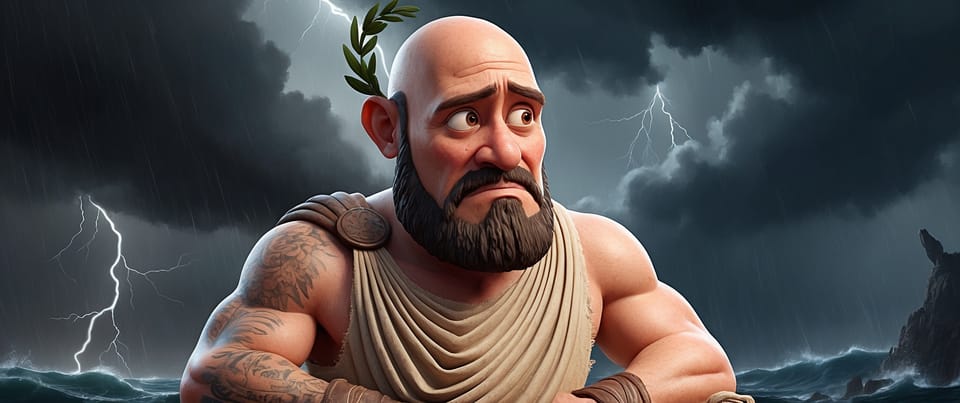Stormy Seas of Self-Pity

It's Monday again; it's funny how that keeps happening. Four days of beer-soaked self-pity later, here I am. Regret's bitter aftertaste lingers, sharper than my last swig. Nursing a throbbing head and bruised ego, I can't help wondering: how'd I end up in this situation... again?
The Quicksand of Self-Pity
You know that feeling of being stuck in quicksand? The more you thrash about, the deeper you sink. That's my current predicament. Each beer dragged me further into the mire, every morning after a stark reminder of my cock-ups. It's a peculiar kind of self-imposed torture.
Self-pity's a rubbish flatmate. Eats all your food, leaves dirty dishes everywhere, and never pays rent. Yet we keep inviting it back. Why? 'Cause it's familiar. Comfortable in its discomfort.
A Lifeline in the Storm
I almost hear Marcus Aurelius whispering, "You've got power over your mind - not outside events. Realise this, and you'll find strength." Easy for you to say, Marc. You were an emperor. I'm just a bloke with a hangover and a knack for poor decisions.
But hang on a second. What would our Stoic ancestors make of this mess? They'd likely remind us that regret, like all emotions, stems from our judgments, not inevitable consequences of events.
Epictetus once quipped, "It's not what happens to you but how you react to it that matters." So here I am, reacting by wallowing in self-pity. Not exactly the pinnacle of Stoic virtue.
The Nature of Addiction
Addiction is a tricky beast. It's like having a mischievous imp on your shoulder constantly whispering, "Go on, just one more. It'll make you feel better." And for a fleeting moment, it does. But that moment passes, leaving us with the aftermath.
The Stoics didn't specifically address addiction (though I'd wager a few of them had their struggles with wine). But they did talk about self-control and the importance of aligning our actions with our values. Seneca advised, "He who does not impose his own direction on life is a leaf that drifts and falls with the wind."
Right now I feel like that leaf blown about by the winds of impulse and habit. But perhaps that's the first step: recognising that I've drifted off course.
The Illusion of Control
One core tenet of Stoicism is the dichotomy of control. There are things within our power and things beyond it. My actions over the past few days were definitely within my control. The fact that I'm an addict? Not so much.
It's a sobering thought (pun intended) that we can't control our predisposition to addiction. But we can control how we respond to it. Every moment presents a new opportunity to make a different choice.
As Marcus Aurelius reminds us, "The impediment to action advances action. What stands in the way becomes the way." Perhaps this relapse, this moment of regret, can become the catalyst for change.
The Path Forward
So, where do we go from here? The Stoics would probably advise us to start by accepting where we are—not in a passive, resigned way, but actively and engaged. Acceptance doesn't mean approval; it means acknowledging reality so we can work with it.
Epictetus said, "First say to yourself what you would be; then do what you have to do." So what would I be? Sober, resilient, at peace with myself. And what do I have to do? Well, that's the million-dollar question.
For starters, I can pour out the remaining beer, reach out to my support network, recommit to recovery one day at a time, and, perhaps most importantly, practice self-compassion.
The Role of Self-Compassion
Now, self-compassion might sound a bit touchy-feely to our Stoic friends. But I'd argue it's entirely consistent with their philosophy. After all, they advocated for treating others with kindness and understanding. Why should we treat ourselves any differently?
Beating ourselves up over past mistakes doesn't change them. It only makes it harder to move forward. As Seneca said, "Every new beginning comes from some other beginning's end." So let's treat this as a new beginning, shall we?
The Bigger Picture
In the grand scheme of things, four days of drinking is a blip—a setback, yes, but not the end of the world. The Stoics were big on perspective, reminding us to zoom out and see our lives in the context of the vast universe.
Marcus Aurelius wrote, "You have seen many things. Now look at what you have not seen: the vastness of time, the infinity of the universe." It's a humbling thought. Our struggles, triumphs, and very lives are but a speck in the cosmic tapestry.
But that doesn't make them meaningless. On the contrary, it makes every moment, every choice infinitely precious. Because this life, this moment, is all we have.
The Practice of Virtue
For the Stoics, virtue was the highest good. They defined it as wisdom, courage, justice, and self-control. How can we apply these virtues to our current situation?
Wisdom: Recognising and learning from the patterns that led to this relapse. Courage: Facing our addiction head-on without flinching or making excuses. Justice: Treating ourselves and others with fairness and compassion.
Self-control: Making choices aligned with our long-term well-being rather than short-term gratification.
It's a tall order, especially when we're feeling low. But as Seneca reminds us, "It is not because things are difficult that we do not dare; it is because we do not dare that things are difficult."
The Road Ahead
So here we are at the end of our reflection. The hangover is starting to fade, but the lessons remain. What have we learned?
- Regret and self-pity are natural but not particularly helpful.
- We can choose our responses even if we can't control our circumstances.
- Addiction is a challenge but not an impossible one.
- Self-compassion is a crucial tool in recovery.
- Our struggles are insignificant in the grand scheme and infinitely crucial in our lives.
- Practicing virtue can guide us through even the darkest times.
As we step forward into a new day, let's carry these lessons with us. Let's treat each moment as an opportunity to align our actions with our values. And let's remember that no matter how many times we fall, we always have the choice to get back up.
After all, as Marcus Aurelius said, "You have power over your mind - not outside events. Realise this, and you will find strength." Maybe old Marc was onto something after all.
Now, to put it into practice.

Member discussion